Mazzoni Center, Philadelphia’s biggest LGBTQ health agency, gets a financial red flag in audit
The Center City nonprofit said the auditor's notice reflected past troubles and that a financial recovery was underway.

Mazzoni Center, Philadelphia’s biggest LGBTQ health agency, has had significant operating losses for three years in a row, as it has struggled to recover from the COVID-19 pandemic.
The nonprofit’s financial condition became so dire that its latest financial statements, issued in October, contained a rare warning from its auditing firm that it might not be able to continue meeting its financial obligations, such as debt payments, for more than year.
A spokesperson for the Center City organization noted that annual statements covered the year ended June 30, 2022, and that a recovery is underway, with patient volumes back to pre-pandemic levels.
“It was a very, very challenging financial circumstance for us, as it was for many organizations, but we have zero worries about the organization as a going concern,” David Weisberg, Mazzoni’s executive development and communications officer, said in an interview Monday.
Patient visits jumped more than 80% to 1,883 last month, up from 1,023 in January 2023, Weisberg said.
Mazzoni had an operating loss of $2.9 million on $12 million in revenue in the year ended June 30, 2022, the audit showed. In fiscal 2021, the loss was $1.5 million on $13 million in revenue. The audit found that Mazzoni failed to meet terms of a loan agreement at the end of fiscal 2023. Mazzoni has since secured a waiver from its lender.
The annual financial statements included a rare financial warning, known as “going-concern notice,” spotted by Audit Watch, a tool developed by Big Local News, a nonprofit based at Stanford University.
A “going-concern notice” is required by standard accounting rules when there is “substantial doubt” about an organization’s ability to meet is financial obligations in the next year. Substantial losses and a loan default are among the reasons such a notice can be issued.
The audited statements covering the year ended June 30, 2023, are not yet completed, but they are expected to show another steep loss, Weisberg said.
Mazzoni was expected to at least break even in the current fiscal year that ends in June, and is doing better than budgeted at this point, Weisberg said. The center employs 130 people.
Past turmoil and the way forward
The financial difficulties at Mazzoni followed a period of management turmoil at the organization founded in 1979. A medical director resigned in 2017 amid allegations of sexual misconduct with patients, followed by a longtime leader who came under pressure for not taking those allegations seriously enough.
Then an interim CEO was accused of sexually harassing employees. A permanent CEO who was heterosexual lasted less than a year. Some questioned whether she was a good fit for the LGBTQ organization.
Sultan Shakir, a Philadelphia native, has been president and executive officer for two years, and has substantially revamped management. Among his hires was a new leader of Mazzoni’s medical and behavioral health services.
Mazzoni’s revenue has fallen sharply from a peak of $17.89 million in fiscal 2019, the last full year before the pandemic, but has begun to turn around thanks to the increase in patient visits and other initiatives, according to Weisberg.
The organization has added 200 patient appointments per week by adding clinicians and changing the way it organizes appointments, Weisberg said. Mazzoni was certified as a type of federal health clinic, known as a federally qualified health center look-alike, at the end of last year.
That change is expected to boost annual revenue by $3 million because it will increase its rates for serving low-income people and increase the amount of money it receives from a federal drug discount program, Weisberg said.
Mazzoni is also adding new services, including remote patient monitoring and a type of cancer screening.
At the same time, Philadelphia’s biggest health systems are increasing their focus on LGBTQ health. Jefferson Health opened the Pride clinic at Jefferson’s Center for Healthy Aging for LGBTQ patients who are 55 and older, and Penn Medicine appointed its first systemwide medical director of LGBTQ health.
Weisberg said Mazzoni does not worry about positioning itself relative to competitors, partly because it offers more wraparound services than other clinics, but also because demand is so high.
“Sadly, there’s more than enough need to go around,” he said.